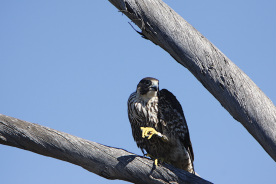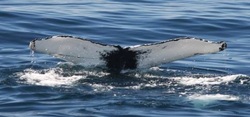Academic Interests
Harnessing Data Science for Environmental Protection and Public Policy
As a professional data scientist, I've become interested in how to harness data science for environmental protection and public policy.
Climate Change and its Implications for Conservation Biology and Policy

Climate change will inevitably have dramatic impacts on the species in which we are attempting to save in conservation biology. If we look at conservation biology as something resembling medicine, than we are currently busy in the emergency room. I'm particularly interested in large mammals and predators. Large mammals tend to fill the role of charismatic megafauna. This enables conservation by proxy approaches in order to both raise support their conservation and to preserve the other organisms that make up their ecosystem. Unfortunately, many large predators are already in in danger of extinction. Climate change threatens to place additional strain on these species as changing temperatures will likely mean a change in the availability of local ecological niches. This can have far ranging impacts in the trophic structure of an ecosystem. Combined with other anthropogenic threats, predator conservation in the 21st century will be a unique challenge.
Integration of Economic Incentives into Biodiversity Protection in Developing Countries
 In Belize back in 2010. Studying community conservation efforts to protect the Howler Monkey.
In Belize back in 2010. Studying community conservation efforts to protect the Howler Monkey.
One of the core questions surrounding biodiversity protection is how to do it while achieving humanitarian goals. I'm interested in developing best practices for establishing conservation programs that simultaneously provide economic benefits to key stakeholders. Eliminating poverty and protecting biodiversity should not be mutually exclusive. My previous work experience in this area included my project for the Clinton Foundation internship program.
Harnessing Citizen Science for Urban Ecological Research

Citizen science holds amazing promise for the scientific community. No where is this more apparent than in the realm of urban ecology. Massive citizen science data sets give us opportunities that past ecologists could only dream of. Right now with the permission of the Cornell Lab for Orthinology, I'm utilizing the ebird data set to investigate biodiversity in major urban centers.
A Juvenile Peregrine Falcon
Source: Wikimedia Commons
A Juvenile Peregrine Falcon
Source: Wikimedia Commons
Spatial Ecology of Marine Mammals in the Gulf of Maine

This is primarily work I did as an undergraduate. I studied Cetaceans (whales) working with the Blue Ocean Society for Marine Conservation and the MacLaren laboratory at Merrimack College. My undergraduate thesis focused on the development of a software program to reduce the impacts of duplication bias from the utilization of multiple observers. As the research had been performed using whale watch boats, this was a common problem in the data set which I worked to correct. Utilizing a corrected data set, I've been investigating the spatial characteristics of the minke, humpback, and finback whale populations in the region.
The Fluke of Mogul the Humpback Whale
Photo credit: Blue Ocean Society
The Fluke of Mogul the Humpback Whale
Photo credit: Blue Ocean Society
